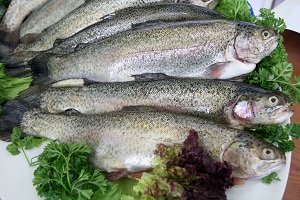Norway.- New findings have revealed differences in the heritability of EPA and DHA in Atlantic salmon. This is important knowledge for breeders.
In the last decade, production of Norwegian farmed salmon has more than doubled. Since the supply of fish meal and fish oil is limited, salmon’s diet has also changed.
Today salmon feed consists of roughly 70% plant proteins and oils. This has led to a decline in the level of the healthy omega-3 fatty acids in the fish.
Can produce the healthy fatty acids
Salmon can actually increase the amount of healthy omega-3 fatty acids in their bodies, by converting shorter chained fatty acids from plants into longer chained marine omega-3 fatty acids. This trait is probably linked to the fact that they spend the first part of their lives in fresh water. In fresh water, wild salmon need to produce marine omega-3 fatty acids themselves, because they do not have access to them in the food they eat. In salmon farming, EPA and DHA is provided in the feed throughout the whole lifecycle.
Previous research has shown that some salmon families have higher levels of the healthy fatty acids in their muscle tissue than others. These kinds of differences can be used in breeding programmes to breed salmon that are better able to produce marine omega-3 fatty acids themselves.
Different omega-3 fatty acids
Salmon contain many different omega-3 fatty acids. Doctoral student Siri Storteig Horn at Nofima has studied the heritability of each individual fatty acid in the SalmoBreed breeding population. She has found major differences.
Stay Always Informed
Join our communities to instantly receive the most important news, reports, and analysis from the aquaculture industry.
“The main marine omega-3 fatty acids in salmon are EPA and DHA. Our findings show that the muscle content of EPA has low heritability, while DHA has quite high heritability, estimated at 26%. In other words, genes determine 26% of the variation in fatty acid content in muscle tissue, meaning there is great potential in increasing this fatty acid through selective breeding. The results also indicated that a fish that has a high level of EPA does not necessarily have a high level of DHA,” says Horn.
Her doctoral research is part of the project “Genomics of omega-3 in Atlantic salmon”. This four-year project is funded by the Research Council of Norway and has a budget of NOK 10 million. The project is in collaboration with the Norwegian University of Life Sciences (NMBU), University of Southampton and SalmoBreed.
It is currently very time consuming and expensive to measure the fatty acid composition of the high number of individuals needed for breeding. Scientists at Nofima are working to develop a new and faster measurement technique.
“A new rapid measurement method will benefit salmon breeding companies if they want to select fish with increased levels of marine omega-3,” says Horn.
The next step
The next step in the doctoral work is to determine which genes and gene variants influence the fatty acid composition of salmon muscle. This will tell us more about the physiological processes that affect the fatty acid composition in muscle, and contribute to more efficient implementation in breeding programmes.
“We know that this is a heritable trait, meaning it is possible to increase omega-3 content through selective breeding. To learn how omega-3 content is regulated, we need to study which genes are involved. Our data show that the production of marine omega-3 fatty acids and their deposition are two different traits”, says Horn.
FACTS ABOUT OMEGA-3 IN SALMON
– There is about 1 gram of the healthy marine omega-3 fatty acids EPA and DHA in 100 g salmon fillet.
– Eating salmon once or twice a week is enough to meet the recommended intake of marine omega-3, according to the European Food Safety Authority.
Contact:
Siri Storteig Horn
Ph.D. Student
Phone: +47 64 97 02 08
siri.storteig.horn@nofima.no
Anna Kristina Sonesson
Senior Scientist
Phone: +47 930 98 047
anna.sonesson@nofima.no
Bente Ruyter
Senior Scientist
Phone: +47 930 97 531
bente.ruyter@nofima.no
Source: NOFIMA
Editor at the digital magazine AquaHoy. He holds a degree in Aquaculture Biology from the National University of Santa (UNS) and a Master’s degree in Science and Innovation Management from the Polytechnic University of Valencia, with postgraduate diplomas in Business Innovation and Innovation Management. He possesses extensive experience in the aquaculture and fisheries sector, having led the Fisheries Innovation Unit of the National Program for Innovation in Fisheries and Aquaculture (PNIPA). He has served as a senior consultant in technology watch, an innovation project formulator and advisor, and a lecturer at UNS. He is a member of the Peruvian College of Biologists and was recognized by the World Aquaculture Society (WAS) in 2016 for his contribution to aquaculture.







